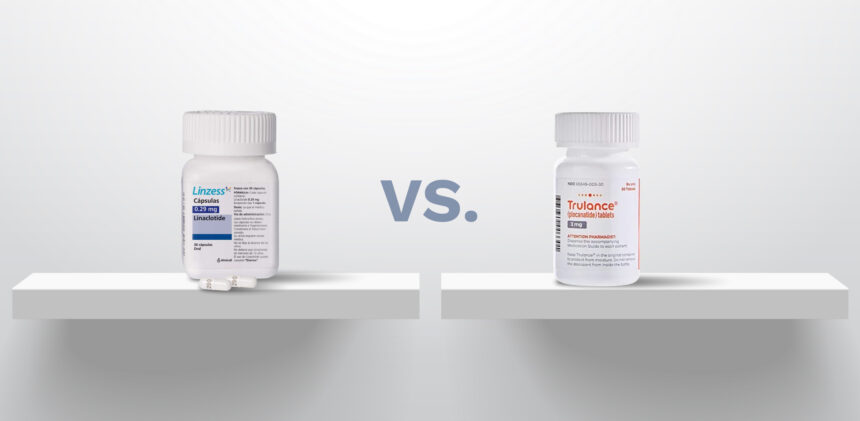When it comes to managing chronic gastrointestinal conditions like irritable bowel syndrome with constipation (IBS-C) and chronic idiopathic constipation (CIC), two medications often come into the spotlight: Trulance and Linzess. Both are prescription drugs designed to alleviate the discomfort associated with these conditions. In this comprehensive guide, we will delve into the key differences between Trulance vs Linzess, helping you make an informed decision regarding your treatment options.
What are Trulance and Linzess?
Before we dive deeper into the comparison, let’s get acquainted with what Trulance and Linzess are.
Trulance is the brand name for plecanatide, a medication developed by Synergy Pharmaceuticals Inc. It was approved by the U.S. Food and Drug Administration (FDA) in 2017 for the treatment of IBS-C and CIC. Trulance works as a guanylate cyclase-C (GC-C) agonist, enhancing intestinal fluid secretion and promoting bowel movements.
Linzess, on the other hand, is the brand name for linaclotide. This medication, developed by Ironwood Pharmaceuticals and Allergan (now AbbVie), received FDA approval in 2012 for the treatment of IBS-C and CIC. Linzess is a guanylate cyclase-C (GC-C) agonist, similar to Trulance, and works by increasing fluid secretion in the intestines to alleviate constipation.
Mechanism of Action
Both Linzess vs Trulance belong to the same class of drugs, GC-C agonists. These drugs stimulate the GC-C receptors in the intestines, leading to increased fluid secretion and accelerated transit of stool through the gastrointestinal tract. This mechanism helps relieve constipation and associated symptoms.
Indications and Approved Uses
Trulance and Linzess are primarily indicated for the treatment of two conditions:
- Irritable Bowel Syndrome with Constipation (IBS-C): This condition is characterized by abdominal discomfort or pain, along with changes in bowel habits, primarily constipation.
- Chronic Idiopathic Constipation (CIC): CIC refers to chronic constipation without a known underlying cause, lasting for an extended period.
Both medications aim to improve bowel regularity and alleviate the symptoms associated with these conditions.
Efficacy in Clinical Trials
To assess the effectiveness of Trulance and Linzess, several clinical trials have been conducted. In these trials, both medications have demonstrated significant improvement in bowel movement frequency and relief from symptoms such as abdominal pain and bloating. However, individual responses may vary.
Side Effects and Safety Profiles
Like any medication, Trulance and Linzess come with potential side effects. Common side effects associated with both drugs include diarrhea and abdominal pain. It’s essential to consult your healthcare provider if you experience severe or persistent side effects.
Dosage and Administration
The dosage of Trulance and Linzess may vary depending on the condition being treated and individual patient factors. It’s crucial to follow your healthcare provider’s recommendations regarding dosage and administration for optimal results.
Cost Comparison
One significant consideration when choosing between Trulance and Linzess is the cost. Prices may vary depending on your location, insurance coverage, and whether generic versions are available. Be sure to check with your insurance provider for coverage details.
Patient Experience and Reviews
Understanding the experiences of individuals who have used Trulance or Linzess can provide valuable insights. Reading patient reviews and discussing your concerns with your healthcare provider can help you make an informed decision.
Availability and Accessibility
Both Trulance and Linzess are available by prescription. Check with your healthcare provider to determine which medication is readily accessible to you.
Interactions and Contraindications
It’s essential to inform your healthcare provider of all medications and supplements you are taking to avoid potential drug interactions. Additionally, certain medical conditions may contraindicate the use of Trulance or Linzess. Discuss your medical history with your healthcare provider to ensure safe and effective treatment.
Choosing Between Trulance and Linzess
The choice between Trulance and Linzess should be made in consultation with your healthcare provider. They will consider factors such as your specific condition, medical history, and individual preferences to determine which medication is the most suitable for you.
Conclusion
In the battle of Trulance vs. Linzess, both medications offer effective solutions for IBS-C and CIC. However, the choice ultimately depends on your unique circumstances and preferences. Consult your healthcare provider to make an informed decision and embark on a treatment plan that provides you with the relief you deserve.
FAQs
Are Trulance and Linzess interchangeable?
Trulance and Linzess are not interchangeable without a healthcare provider’s guidance. The choice between the two depends on various factors, including your specific condition and medical history.
Do Trulance and Linzess have generic versions?
As of now, Trulance and Linzess both lack generic versions. They are available in their brand-name forms.
Can I take Trulance or Linzess with other medications?
Discuss any potential drug interactions with your healthcare provider. They can advise you on the safety of combining Trulance or Linzess with other medications.
How quickly do Trulance and Linzess work?
Both Trulance and Linzess typically begin to work within a few days to a week. However, individual responses may vary.
Are there any dietary restrictions while taking Trulance or Linzess?
Your healthcare provider will provide specific guidance regarding dietary restrictions, if any, while taking Trulance or Linzess. It’s essential to follow their recommendations for optimal results.





